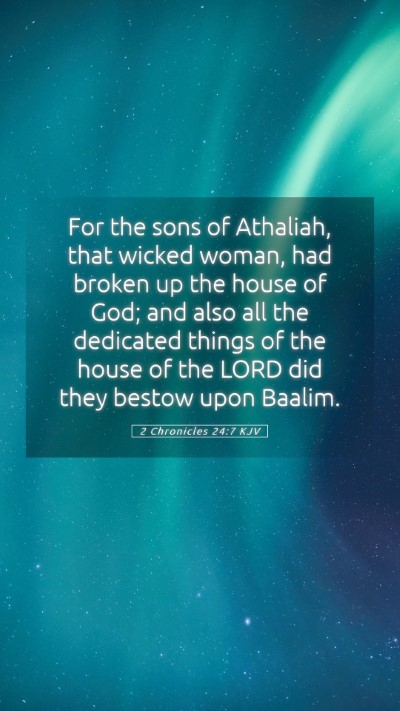Meaning and Interpretation of 2 Chronicles 24:7
2 Chronicles 24:7 states: "For the sons of Athaliah, that wicked woman, had broken up the house of God; and also all the dedicated things of the house of the LORD did they bestow upon Baalim."
This verse encapsulates a pivotal moment in the history of Judah, shedding light on the destructive actions of Athaliah and the profound consequences of idol worship. Below is a detailed analysis drawing from various public domain commentaries to provide a comprehensive understanding.
Context of the Verse
This passage occurs during the reign of Athaliah, who was notorious for her idolatrous practices and her efforts to eliminate the royal line of David. The verse highlights the systematic dismantling of worship and the theft of sacred treasures meant for God, which symbolizes a rebellion against the Lord.
Key Insights from Commentaries
- Matthew Henry's Commentary:
Henry posits that Athaliah's actions reflect a deep-seated wickedness and a profound disregard for God’s temple. Her role as a usurper of authority led to her corrupting influence over the nation, drawing them into idolatry. The mention of "Baalim" illustrates the grave sin of forsaking the true God for false idols.
- Albert Barnes' Notes:
Barnes emphasizes the severity of Athaliah's evil legacy, noting that she not only sought to destroy the royal heirs but also dismantled the very foundation of Israel’s worship. The dedicated offerings, which were intended for use in the service of the Lord, were instead given to Baal, demonstrating a significant betrayal of faith. This reflects a broader theme of apostasy that resonates throughout the Hebrew Scriptures.
- Adam Clarke's Commentary:
Clarke elaborates on the historical implications of this verse, pointing out that the actions of Athaliah had dire repercussions for the nation of Judah. By undermining the temple, she was not just committing acts of personal treachery but was also leading the entire nation away from God, which would set the stage for future judgments and disasters as a consequence of collective sin.
Bible Verse Explanations and Applications
The understanding of 2 Chronicles 24:7 is vital for modern readers as it offers lessons about idolatry, leadership, and faithfulness to God. The passage serves as a warning against the influences that can lead one’s heart astray from God’s commandments.
Lessons Learned:
- The danger of leadership corruption: Athaliah's influence reminds us of the potential for leaders to lead their followers into sin.
- Importance of protecting holy places: The temple is symbolic of worship; neglecting spiritual duties opens the door to secular influences.
- The consequences of idol worship: The verse illustrates how misplaced devotion brings about ruin not only to individuals but to entire communities.
Cross References
To gain a deeper understanding and context for 2 Chronicles 24:7, consider these related verses:
- 2 Kings 11:1-3: Outlines the events surrounding Athaliah’s reign and the protection of Joash.
- 2 Chronicles 22:10-12: Details Athaliah's rise and the response of God’s faithful.
- 1 Kings 16:31: Highlights the wickedness of those who turn away from God, similar to Athaliah.
Conclusion
In conclusion, 2 Chronicles 24:7 serves as a profound reminder of the dangers posed by idolatry and corrupt leadership. Through a combination of historical context, detailed commentary, and application, we are encouraged to remain steadfast in our faith and vigilant against influences that can lead us away from God. Understanding Scripture is key to ensuring our lives reflect God’s glory in a world that often seeks to divert our attention.
Engaging in a Bible study group or utilizing Bible study tools can enhance our Bible verse interpretations and provide further insights into the depths of Scripture.


